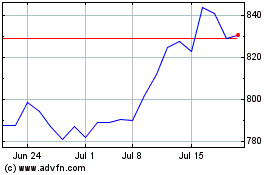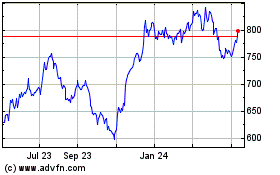BlackRock Is Offering a Free Perk That Lets It See Inside Your Portfolio
June 18 2018 - 7:29AM
Dow Jones News
By Sarah Krouse
The world's largest asset manager hopes to sell more investment
products to Main Street with one of the oldest strategies in
business: the freebie.
BlackRock Inc. is coaxing financial advisers to upload their
client holdings to a complimentary BlackRock website that tests how
those portfolios perform under different economic scenarios and
compare them to peers. About 20,000 financial advisers have used
the "BlackRock Advisor Center" tool since October.
Advisers receive free access to a website powered by a version
of BlackRock's technology called Aladdin that big Wall Street firms
and insurers use to assess risks.
BlackRock's hope is that financial advisers will in turn buy
more BlackRock funds. A spokeswoman said the technology "helps
advisors manage their practices in a more efficient and scalable
way."
The New York money manager sells a more extensive version of its
Aladdin technology to brokerages that have larger networks of
financial advisers, like UBS Group AG and Morgan Stanley. That
service is meant to give those companies a view of the risks within
client portfolios across their branches.
BlackRock is under pressure to find new ways into wealth
management because of changing regulations in the asset-management
industry as well as a move by price-conscious investors to push
down the cost of investing.
A new Labor Department rule that went into effect in April 2016
required brokers who work on retirement accounts to put their
customers' interests ahead of their own. That has meant fewer funds
make it into brokers' lineup of products, a danger for firms like
BlackRock that rely on financial advisers to sell their products to
everyday investors.
The Labor Department rule was thrown out by a U.S. Circuit Court
in March, and the Securities and Exchange Commission is now working
on its own version of a best-interest rule that would apply to
brokers.
An initial goal of the Advisor Center was to help turn BlackRock
into a hub of data on wealth management akin to what Facebook is
for information on relationships and Amazon.com Inc. is for
commerce intelligence, people familiar with the matter said.
Gathering data on wealth-management portfolios would give
BlackRockan indicator of potential fund-buying behavior and where
it might be able to sell more of its funds in addition to improving
its relationships with financial advisers.
BlackRock, which manages $6.3 trillion in assets, has
historically had to collect this information through individual
meetings with wealth advisers or rely on external data providers
because it doesn't sell mutual funds or exchange-traded funds
directly to retail investors as rivals Vanguard Group and Fidelity
Investments do.
Here is how the free Advisor Center website works: Financial
advisers can test how a portfolio would do if, say, oil prices rose
35% or stock-market volatility increased by 20%. An adviser
researching a certain type of fund would initially be shown
BlackRock's version of it.
Typing in the ticker for a rival fund from Vanguard Group or
Charles Schwab that tracks the performance of the S&P 500, for
example, results in a link to the landing page for the iShares Core
S&P 500 ETF, a BlackRock product, according to financial
advisers that have used the free version of the technology.
A recent update to the site allows financial advisers to compare
a customer's portfolio to about 7,000 other adviser portfolios,
according to documents reviewed by The Wall Street Journal. That
data comes from portfolios BlackRock's wealth-advisory staff saw
during meetings with advisers and through the online tool during a
six-month period through the end of February.
Providing a free platform where financial advisers voluntarily
input portfolio data can yield big profits if it leads to more fund
or technology sales. Other firms including JPMorgan Chase & Co.
also offer free portfolio-analysis technology to financial
advisers.
Some observers say potential conflicts of interest for financial
advisers are possible if they compensate BlackRock or another fund
firm that offers technology by putting that firm's funds ahead of
other products that may be better suited for their client.
"For me, where the rubber meets the road is how advisers are
using the service and whether the advisors' recommendations are in
their clients' best interest," said Arthur Laby, a professor at
Rutgers Law School and former official at the Securities and
Exchange Commission.
Such tools could also raise the prospect of privacy risks for
customers, depending on what information their adviser shares, Mr.
Laby said.
BlackRock's terms and conditions make advisers acknowledge that
they are responsible for getting customers' permission to enter
information related to them.
"Advisor Center has purposefully been designed with an eye
toward model portfolios and keeping an advisor's clients anonymous
to BlackRock. We do not require advisors to use their clients'
personal information when using Advisor Center -- in fact, we say
we do not want it, nor do we have any need for it," a spokeswoman
said.
Write to Sarah Krouse at sarah.krouse@wsj.com
(END) Dow Jones Newswires
June 18, 2018 07:14 ET (11:14 GMT)
Copyright (c) 2018 Dow Jones & Company, Inc.
BlackRock (NYSE:BLK)
Historical Stock Chart
From Mar 2024 to Apr 2024

BlackRock (NYSE:BLK)
Historical Stock Chart
From Apr 2023 to Apr 2024
